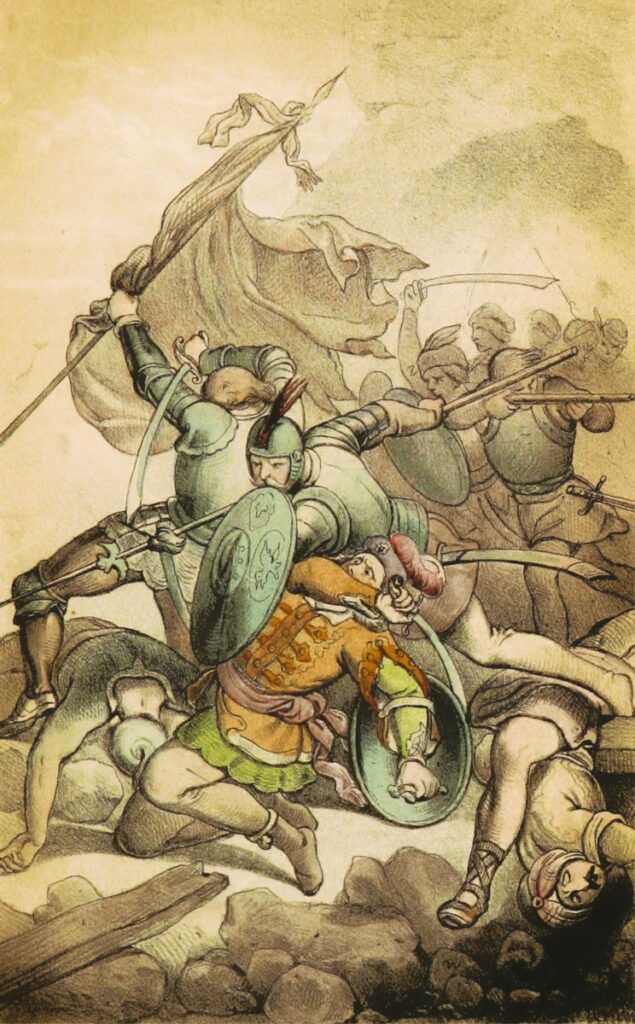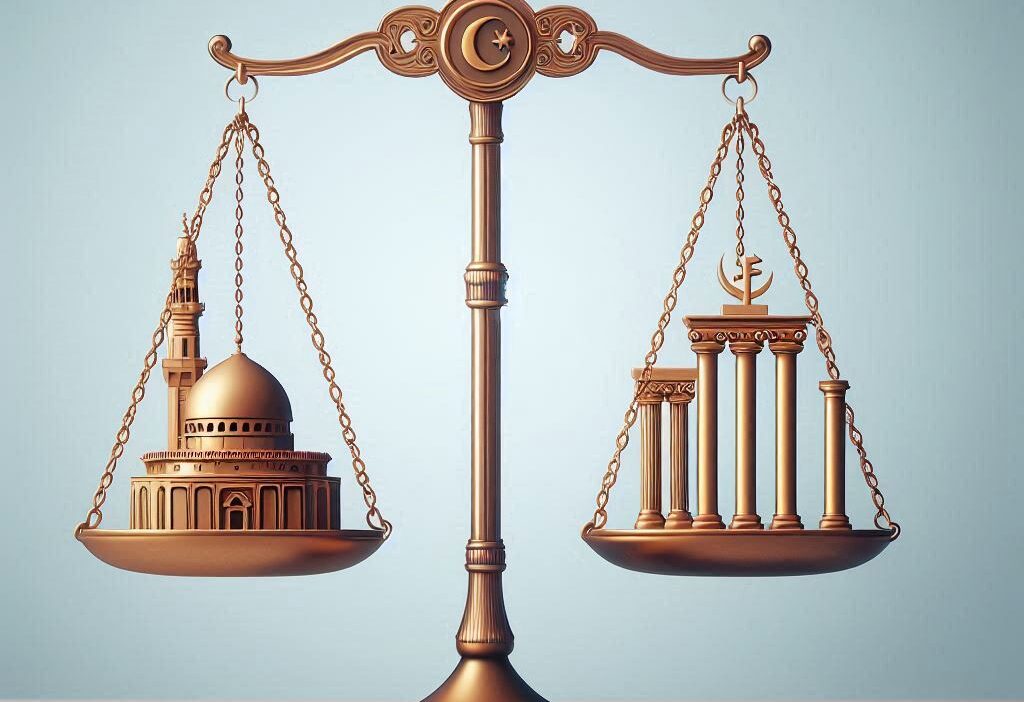Today more than ever, Muslims are facing an unprecedented challenge to the very core of our faith.. Pervasive Western views, acting as the self-appointed arbitrators of right and wrong, demand that Islamic beliefs and practices are evaluated by their moral standards.
This challenge is compounded by a post-colonial mentality, a psychological residue of centuries of political and cultural domination—that leads many Muslims to unconsciously accept Western civilization as the default standard for progress and legitimacy.
In this article I argue that rather than defending Islam by Western standards, Muslims should confidently articulate Islam from its own foundations. I will examine three key areas:
- first, the foundations of Islamic morality;
- second, the problems that arise when judging Islam by Western standards; and
- third, a practical application of these principles to a contentious contemporary issue.
Part I: The Foundations of Islamic Morality
Islam as Objective Truth
Islam teaches a fundamentally different understanding of morality than contemporary Western thought. In Islam, truth is not determined by human societies, cultures, or evolving opinions, but is established by Allah through revelation. What constitutes good (maʿruf) and evil (munkar) is defined by the Qur’an and Sunnah, creating a moral framework that transcends time and culture.
The Sharia represents universal and timeless principles, valid for all peoples and all eras. As Ibn Taymiyyah explained, the laws of Allah are “just and wise for all creation, in all times and places.”1 This divine legislation provides stability and objectivity that human-constructed moral systems cannot offer.
The Problem with Moral Relativism
Every historical period develops its own moral assumptions, shaped by unique circumstances and experiences. What one era considers “progressive” may appear misguided to another. The Western moral framework, rooted in individualism and secularism differ fundamentally from the Islamic worldview.
Western moral relativism holds that ethical values are not absolute but relative to time, place, and culture. The rise of secularism and materialism has eroded absolute moral standards, leaving right and wrong to be defined by majority opinion or shifting social trends. This stands in direct contrast to Islam’s concept of objective, divinely revealed truth. Shaykh al-Islam Ibn Taymiyyah warned against this approach: “Whoever makes truth dependent on people’s whims or customs has strayed from the straight path, for Allah Almighty says: “And if you obey most of those on earth, they will mislead you from the way of Allah.”2
Islam challenges moral relativism by insisting that there are fixed standards of right and wrong, rooted in revelation. This stands in stark contrast to the practice of Western churches, which have abandoned many of their teachings to fit in with prevailing customs and practices. One example is their stance on homosexuality, where centuries of theological understanding have been discarded to pander to contemporary social norms. Such changes are a compromise of divine principles for worldly acceptance. Ibn Taymiyyah wrote: “The good that Allah commands is good, and the evil that He forbids is evil, and there is no good except what He has made good, and no evil except what He has made evil.”3
Human Intuition and Divine Guidance
A crucial question arises: if humans possess an ability to discern between right and wrong, why do we need divine guidance? The answer lies in the explanation of the concept of the fiṭrah
Every human being is created with a natural disposition (fiṭrah) that inclines them toward recognizing Allah and possessing a basic moral compass. Most people intuitively understand that murder, theft, and betrayal are wrong, while honesty, justice, and compassion are good.
As Ibn Taymiyyah writes: “The fiṭrah is that with which Allah created His servants, as the Prophet said: ‘Every child is born upon the fiṭrah, then his parents make him a Jew, a Christian, or a Magian.’“4 However, this innate moral sense can become corrupted through three main influences:
- Personal desires (hawā): Passions and self-interest can cloud moral judgment, leading people to justify wrong behavior for pleasure or gain.
- Social conditioning: Cultural upbringing and social norms can distort natural moral intuitions, as the hadith indicates when describing how parents and society shape children’s beliefs.
- Flawed reasoning: Human intellect, while valuable, remains limited and can be misled by incomplete information or persuasive but false ideologies.
Therefore, while fiṭrah provides a foundation for recognizing moral truths, it proves insufficient alone. Divine revelation (wahy) serves as the ultimate reference point, confirming what exists in human nature, restoring what has been lost, and providing detailed guidance where natural intuition falls short. As Ibn Taymiyyah stated: “The Messengers were sent to perfect the fiṭrah, clarify what was ambiguous, and correct what was altered or corrupted.”5
Part II: The Problem of External Judgment
Why Western Standards Cannot Judge Islam
Judging Islam by Western standards is problematic for a number of reasons:
Unique History: Western values emerged from unique historical experiences, and a reaction against the abuses of the medieval Church. Their values are not neutral or universal but reflect the experiences of their civilization.
Contradiction of Islamic Foundations: This approach ignores Islam’s objective, timeless nature. When Muslims judge Islamic teachings by external, ever-changing criteria, they effectively reject Islam’s divine foundation.
Secularization of Islam: Accepting an external critique of Islam leads to “secularizing” Islam, reducing it to a set of rules valid only when they conform to Western values. This transforms Islam from a comprehensive way of life rooted in revelation into merely another ideology competing in the marketplace of modern ideas.
The Problem of Anachronism: This occurs when judging past societies and practices by present standards whilst implicitly assuming the superiority of the present. Human customs and opinions constantly change; what one era accepts, another condemns. Making shifting human opinion the standard for truth creates confusion, contradiction, and injustice. Only divine revelation provides stable, objective foundations for morality and law.
Progress: Islamic and Western concepts
Calls for an “Islamic Renaissance,” or “Reformation” often come from the assumption that all civilizations must follow the same path as Europe—breaking away from religious authority to achieve progress. However, this assumption overlooks the unique historical experiences of Europe.
Western Progress
Western thought views history as a linear progression, with earlier periods considered more “backward.” This perspective was heavily influenced by Europe’s turbulent past, particularly the immense power and abuses of the medieval Church.

For centuries, the Catholic Church wielded immense power over nearly every aspect of European life, from politics and education to science and personal belief. It waged war against scientific inquiry, and tortured and executed those who held different theological views, creating a reign of terror across Europe. The Crusades, launched under papal authority, resulted in the massacre of countless Muslims, Jews, and Eastern Christians. Closer to home, the Church orchestrated regular pogroms against the Jews. It also played a central role in European colonialism and the genocide of indigenous peoples.
The result of these excesses was a profound backlash against religion. As disillusionment with brutality of the Church authority grew, intellectuals and reformers began to seek alternatives. This gave rise to humanism, a movement that emphasized, in contrast to Church dogma, the value and dignity of human beings. From humanism, the trajectory continued toward secularism, as thinkers increasingly argued for the separation of church and state. As secularism took root, some intellectual currents moved further, embracing atheism as a worldview. In the 19th and 20th centuries, these trends contributed to the spread of communism, which explicitly rejected religious authority and promoted a materialist vision of society.
Islamic Progress
During the centuries when Europe was struggling under Church dominance, the Islamic world was flourishing. There was no equivalent to the Inquisition, no persecution of scientists, and no institutional barrier to intellectual progress. From the 8th to the 14th centuries, Islamic civilization became a global centre of learning, scientific discovery, and cultural flourishing. Cities like Baghdad, Cordoba, Cairo, and Samarkand were renowned for their libraries, universities, and vibrant intellectual communities. Scientists from diverse backgrounds—Muslim, Christian, Jewish, and others—collaborated and contributed to advancements in mathematics, astronomy, and medicine.
Unlike medieval Europe, where religious and intellectual oppression led to an anti-religious backlash, Islamic civilization did not experience similar conditions, and thus, no such reaction occurred.
The Islamic understanding of civilisation and progress is markedly different from Europe. As Muslim we hold that the most civilized and advanced society was the community of Muslims around Prophet Muhammad ﷺ fourteen centuries ago. No society has reached or will reach the pinnacle of perfection they achieved. The subsequent period of the Rightly-Guided Caliphs (Khulafa Rashideen) represents the second-greatest civilization. The Prophet Muhammad (salalahu alaihi wa sallam) said:
“The best of people are my generation, then those who will follow them, and then those who follow them.6
What made these societies advanced was not technological development, but their strong connection with Allah, and applying Islam completely, While Europe languished under Church oppression, Islamic civilization flourished with principles of justice, learning, and tolerance.
Part III: Defending Islamic Teachings – Practical Applications
With these foundations established, I now select one out of many ‘contentious’ issues, demonstrating that we need not apologize to contemporary Western critics.
Islamic Criminal Law (Hudud)
The Qur’anic punishment of amputation for theft is condemned by Western societies as “barbaric” and violating basic ‘human rights’. This criticism fundamentally misunderstands both the nature of Sharia and its practical application.

Islam recognizes rights as ultimately defined by Allah, not fluctuating human opinion. The punishment for theft punishment serves higher objectives: protecting property, deterring crime, and preserving social order. Islamic law prioritizes collective good over exaggerated notions of individual liberty.
Islamic law never applies punishments arbitrarily or without due process. For the hadd punishment, several strict criteria must be fulfilled:
- Significant theft amount: The stolen property must reach minimum value (nisab) of approximately a quarter dinar (worth about £340 today). The Prophet ﷺ said: “The hand should not be cut off except for a quarter of a dinar or more“7
- Secure location: Items must be taken from secure places like locked houses or guarded stores, not from unattended public areas.
- No valid excuse: Theft due to hunger or dire need can waive the punishment. The Prophet ﷺ said: “Ward off the hudud from the Muslims as much as you can. If there is any way out for him, then let him go, for it is better for the leader to err in forgiveness than to err in punishment“8
- Clear evidence and due process: Acts must be proven through reliable witness testimony or free confession without coercion. Any doubt leads to punishment waiver, following the Prophet’s ﷺ guidance to avoid applying hudud whenever possible.
Societies implementing hudud experience virtually zero crime rates, especially theft. The punishment act as powerful deterrent, creating security in homes, businesses, and public spaces. The collective benefits are immense: restored trust, flourishing economic activity, and protection for the weak and vulnerable.
Conclusion
Islam represents an objective, timeless truth, and the Sharia provides a divinely revealed path to justice, mercy, and human flourishing. Muslims should strictly uphold the Qur’an and Sunnah, seek to understand these two divine sources according to the Salaf, and engage the world from a position of confidence and clarity, always measuring ideas by divine revelation, not fleeting human trends.





